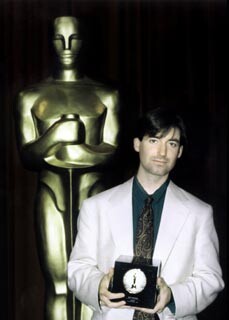The Electronic Intifada 20 December 2002

Above: James Longley received the Student Academy Award from the Academy of Motion Picture Arts and Sciences for his short documentary, “Portrait of Boy with Dog,” about a boy in a Moscow orphanage. “Gaza Strip,” his first feature documentary, was produced on location during the spring of 2001.
“Unless people stand up in vocal opposition to what they feel is wrong, there is a good chance that their views will simply go unnoticed,” Longley told EI in an interview. “When I won the Student Academy Award eight years ago I felt it was a great honor and very exciting. The Academy makes a big point of touring you through all of the big Hollywood institutions, introducing you to all the right people and effectively inviting you to be part of the club.”
Longley added that, “to now return the award would be a way to publicly reject that invitation on principle, to take a personal stand in favor of free speech and against what I perceive to be unfairness and cowardly partisan politics on the part of the Academy.”
EI reported on 10 December that AMPAS Executive Director Bruce Davis had told the producer of Elia Suleiman’s award-winning film, “Divine Intervention,” that it could not be entered into the competition for Best Foreign Language Film because Palestine is not a recognized member state of the United Nations. In fact, AMPAS routinely accepts official entries from territories, such as Wales, Hong Kong, Taiwan and Puerto Rico that are neither independent states, nor have any status at the United Nations, and its published rules make no mention of a UN membership requirement.
Despite Davis’ position that the film could not be entered, John Pavlik, communications director for the Academy wrote to Longley and others who had protested, that since “Divine Intervention” was never formally submitted to the Academy, “no decisions were made by the Academy with regard to accepting the film.”
This technicality is rather like a shopkeeper protesting that he has never refused to hire a Palestinian because none has ever asked for a job, while failing to mention the sign on his door stating ‘Palestinians need not apply.’ In its responses to Longley and media enquiries, the Academy has continued to act as if mere procedure is at issue, while refusing to acknowledge that Davis’ ruling that Palestine is ineligible effectively shut out “Divine Intervention.”
Pointing to the glaring inconsistencies in the Academy’s attempts to explain the exclusion of Palestine, Longley wrote to Davis, “I must ask how AMPAS can explain this apparent double standard.” He is still waiting for a reply.
James Longley won the Student Academy Award for his short documentary, “Portrait of Boy with Dog,” about a boy in a Moscow orphanage. “Gaza Strip,” his first feature documentary, has been exhibited at dozens of film festivals, cinemas and universities around the world. The film was so popular at last April’s Chicago Palestine Film Festival that hundreds of people had to be turned away, even when an unscheduled screening was added. Learn more about James Longley and his films at www.littleredbutton.com

Above: James Longley.
Full EI Interview with James Longley:
EI: Why did you feel a need to say you would return your Student Academy Award over the exclusion of Divine Intervention?
James Longley: Unless people stand up in vocal opposition to what they feel is wrong, there is a good chance that their views will simply go unnoticed. When I won the Student Academy Award eight years ago I felt it was a great honor and very exciting. The Academy makes a big point of touring you through all of the big Hollywood institutions, introducing you to allthe right people and effectively inviting you to be part of the club. To now return the award would be a way to publicly reject that invitation on principle, to take a personal stand in favor of free speech and against what I perceive to be unfairness and cowardly partisan politics on the part of the Academy.
EI: What is your reaction to the Academy’s response?
James Longley: Predictably, the Academy is attempting to squirm out of the situation without addressing the bigger issues, such as why a film from Palestine was discouraged from participating while films from other places with far less official recognition as states are allowed to compete. I am still waiting for a response to my 17 December letter.
EI: What do you think lies behind the Academy’s decision to deem Palestine ineligible for the Best Foreign Language Film Oscar?
James Longley: Given that the “Palestine is not a state” excuse used by the Academy clearly contradicts their own past actions, I am left with no other possible conclusion than the Academy acted in a politically motivated way when it discouraged the producer of “Divine Intervention” from entering his film. Anyone who has seen “Divine Intervention’ can well imagine the almost desperate desire on the part of some not to have attention given to this film in the United States.
EI: Is there a connection between the fate of Elia Suleiman’s “Divine Intervention” which has been excluded from the Oscars, and Muhammad Bakri’s documentary “Jenin, Jenin” which has been banned by Israel?
James Longley: While I have not seen “Jenin, Jenin” I have certainly heard the arguments of its detractors. The issue boils down to one of freedom of speech, and the suppression of it. It is clearly the intent of many in the pro-Israeli government camp to squelch voices with which they disagree. One might conclude that this is only necessary because of the inherent weakness of their position in a fair and open debate.
EI: “Divine Intervention” has been celebrated as a major achievement outside the United States, winning a Jury Prize at Cannes, as well as the European Film Award, and yet it can’t even enter the Oscars this year. Can you reflect on this based on the reception your own film, “Gaza Strip” has received?
James Longley: My own experience with “Gaza Strip” has been more prosaic. It has received very positive reviews and an enthusiastic audience response everywhere it has been shown. I chalk up the lack of U.S. broadcasters to pure terror on their part. I was told flat out by a vice president of programming at PBS that though he liked the film it would be “politically very difficult” to show it. He was being diplomatic; it is politically impossible to broadcast a documentary like mine in the United States on a national network. Not because it isn’t a good documentary, but because broadcasters are terrified of showing something that contradicts the status quo when it comes to Israel-Palestine, and broadcasters have no incentive to be anything but spineless. Neither, apparently, does the Academy of Motion Picture Arts and Sciences.
EI: What role do you think film plays in Palestine? What role do films about Palestine play in the rest of the world?
James Longley: Until the Israeli occupation of Palestinian land ends, I think there won’t be much opportunity for Palestinians to think about normal things like going to the movies. Internationally, of course, films about Palestine play an extraordinarily important role. I maintain that if the American public could only see for themselves what is taking place, the Middle East conflict would end because all support for Israel’s policy of occupation would evaporate instantly. Film has the power to provide that window.
Related Links:
Ali Abunimah is one of the founders of the Electronic Intifada. Benjamin J. Doherty is an occasional contributor. EI’s Nigel Parry also contributed to this report.





